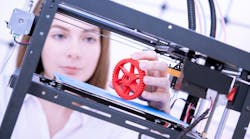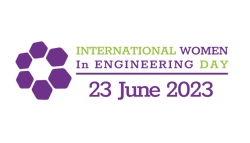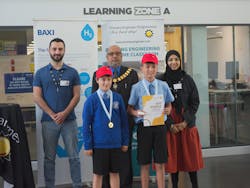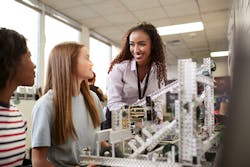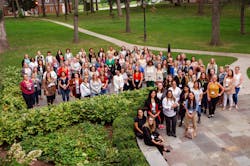June 23 is International Women in Engineering Day (INWED) which celebrates its 10th year in 2023. Originally begun as a national campaign created by the UK-based Women's Engineering Society (WES), it quickly grew to an international event focused on celebrating women in engineering. The theme for 2023 is #MakeSafetySeen.
So why do we need a special day dedicated to women in engineering? Well, while efforts are being made to bring more women into the engineering field, their numbers are still well below that of their male counterparts. Per WES, a March 2022 Engineering UK report showed women make up just 16.5% of the engineering community in the United Kingdom which was a slight increase from the 10.5% reported in 2010.The statistics for the U.S. are similar. According to the U.S. Census Bureau, the representation of women in STEM fields (science, technology, engineering and math) has increased since the 1970s. While large gains have been made in math and life and physical science occupations, women working in computer and engineering has not grown as much. The Census Bureau estimates women account for about 15% of the engineering workforce as of 2019 (currently the most recently available data) whereas women represent 47% of the workforce in math related fields and 45% in life and physical science.
Given women make up a large part of the total workforce, and many industries including engineering are facing a skills gap and need to attract more people, particularly younger generations, into their markets, having days like INWED are important to not only highlight the accomplishments of those already in the field but also provide a means of helping attract more women into engineering.
Early Education in Engineering is Key
Several companies and organizations are doing their part to help introduce women to the field of engineering. And doing so at a young age is key — just as it is for men. The younger you can get people interested in engineering, the better the chances are they will stick with learning about it and entering the field.
"We need to educate children on what an engineer does, and the wide variety of career paths open to them," said Aisha Siddique, a Mechanical Engineer degree apprentice at Baxi — a developer of heating technologies — in the company's press release discussing the importance of IWED and taking part in STEM activities for students.
The company believes it is important to introduce school-aged children to engineering and works to do so in its local community by partnering with Primary Engineer which brings engaging, engineering related projects to schools. As an apprentice at Baxi, Siddique is involved with this project and sees its importance for fueling the future workforce.
"Understanding why we’ve chosen this career and bringing engineering into the classroom is so valuable," she said. "The projects also really help develop essential skills like visualizing, creative problem-solving, testing and evaluation, improving and adapting, along with teamwork and communication – all of which come into play with engineering."
Baxi also sees its apprenticeship program as an important step to helping bring more women into the industry. For her apprenticeship, Siddique is currently working with the company's R&D team but will also spend time in other departments over the coming years to expand her knowledge and experience. "I’m really enjoying my apprenticeship with Baxi," she said. "The experience I am gaining in the workplace is fantastic – it’s great to have a real-world context to my studies."
In the fluid power world, the National Fluid Power Association (NFPA) does a lot of work to bring education about engineering, and particularly hydraulics and pneumatics, to students of various ages through the NFPA Education and Technology Foundation.
For middle schoolers there is the Fluid Power Action Challenge during which students build a fluid power mechanism and then compete against other teams in a timed competition. At the college level, the NFPA Fluid Power Vehicle Challenge tests students on their ability to create a bicycle-based vehicle powered by hydraulics and pneumatics.
These and many other similar programs are great ways to get women and men interested in the field of engineering.
READ MORE: NFPA Fluid Power Vehicle Challenge Provides Real-World Engineering Experience
Encouraging Women in All Aspects of Their Career
Global construction and agricultural equipment OEM CNH Industrial is spotlighting its iGLOW program in honor of IWED 2023. The intent of iGLOW is to promote inclusivity, growth, leadership and opportunity for women by empowering them to inspire others to learn and reach their full potential the company explains.
Members of the iGLOW group meet monthly, virtually or in person, to recognize achievements, publicize vacancies, and encourage others to join groups which can help them reach career goals such as Toastmasters International, which promotes public speaking.
iGLOW was started by Cathy Starr, Director of Global Parts Operations, and Laura Gerstner, Director of Precision Technology Enterprise Program Management, at the CNH office in Burr Ridge, IL. Since its start in 2020, the program has spread across other offices in the U.S. as well as in Europe and Asia.
According to Starr, iGLOW was started to create a means of networking and professional development not typically possible through human resources departments. With this group, titles are not important — meetings are meant to be an inclusive space, free of judgement in which members can discuss their careers and help one another achieve goals.
CNH says the program has helped hundreds of women with their careers, including working their way up to management, making a sideways move or just learning how to be a better colleague.
Establishment of support systems like this can be beneficial to helping women stay with their career goals; it provides them with others to talk to about any challenges they may be facing as well as others who may have experienced similar concerns who can offer advice.
A study conducted by researchers at the University of Wisconsin-Milwaukee found that almost half of the women surveyed left the engineering field because of the working conditions, with many also citing the lack of other female engineers and women mentors as the reasons they left because it made the engineering field feel like a lonely place for them.
One bright spot from the study though was that those women who did stay in engineering noted it was because the companies they worked for encouraged their training and professional development as well as recognized contributions they'd made and provided opportunities and career advancement.
READ MORE: How Do We Attract More Women to Fluid Power and STEM?
As labor continues to be a challenge for manufacturing, engineering and a variety of other industries, encouraging women to enter these fields — and supporting them throughout their careers — will be an important step in creating the future workforce while also bringing in new ideas and perspectives that can help to bring about further technological and other benefits.
We want to hear from you!
How will you be celebrating International Women in Engineering Day? What do you think could be done to attract more women into engineering? What efforts are you seeing which you think are doing a good job so far?
Let us know! Reach out directly via email [email protected] or on social media.
Twitter: @TechnlgyEditor or @PowerMotionTech
LinkedIn: @PowerMotionTech
Editor’s Note: Power & Motion's WISE (Workers in Science and Engineering) hub compiles our coverage of workplace issues affecting the engineering field, in addition to contributions from equity seeking groups and subject matter experts within various subdisciplines.
